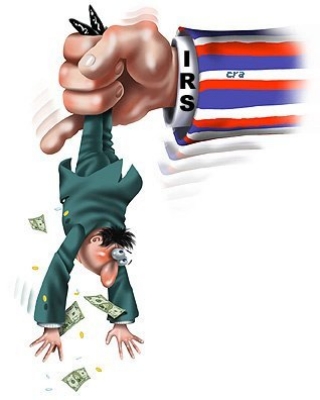The Bailout of Liberalism
 In yesterday's address to the huddled masses yearning for freedom from responsibility, President-elect Barack Obama put more meat on the dry bones of his economic stimulus plan. As he calls for increased spending on, among other things, making federal buildings more energy efficient, improving America's infrastructure and roads and repairing school buildings, it would do us all much good to contemplate how we got to the point where economic stimuli are considered necessary in the first place.
In yesterday's address to the huddled masses yearning for freedom from responsibility, President-elect Barack Obama put more meat on the dry bones of his economic stimulus plan. As he calls for increased spending on, among other things, making federal buildings more energy efficient, improving America's infrastructure and roads and repairing school buildings, it would do us all much good to contemplate how we got to the point where economic stimuli are considered necessary in the first place.
All that ails the economy at present began with the unraveling of the housing market, which was precipitated by policies that go back to the Carter presidency. The 1977 Community Reinvestment Act - along with subsequent "enhancements" enacted by President Clinton in 1995 that allowed securitization of subprime loans - served to kick-start the downward spiral.
And at the center of it all was none other than Rep. Barney Frank. A Wall Street Journal op-ed notes that as far back as 1992, Frank was "a stalwart opponent of reforming [Freddie Mac and Fannie Mae]." Even his own home-town newspaper reminds us that in 2003, when the Bush administration proposed stricter oversight of Freddie and Fannie as they guaranteed more and more bad paper, "Frank was adamant that 'these two entities... are not facing any kind of financial crisis.' " To no one's surprise, instability in the housing market led inexorably to the credit crisis besetting the economy.
Given Mr. Frank's culpability vis-a-vis housing, it would seem that he would fall mute on the matter of bailing out the "Big Three." While such is devoutly to be wished, Frank waxed Solomonic on the need for some sort of assistance to the benefactors of the Left's favorite union. And as liberals in Congress scolded Messrs. Richard Wagoner, Robert Nardelli and Alan Mulally for arriving in Washington, D.C. last month in corporate jets to plead their case for an infusion of cash, they made no call whatever for terminating costly UAW perks such as job banks for laid-off workers and lavish pension and health benefits for retirees (the UAW's feeble effort at givebacks notwithstanding.) As discussed elsewhere, the proposed bailout of Detroit's automakers is little more than a bailout of the ever-shrinking union movement.
We can add to all of the foregoing the fact that - to paraphrase Rev. Wright - the welfare state's chickens have come home to roost as individual states (i.e.: New York and California) have gotten into the act of pleading for bailouts. Budgets strained by diminished revenues and increased expenditures are occasioned by the profligacy of Left-leaning state legislatures and local governments. It is interesting that even as political liberalism seems to be on an upswing, economic liberalism (or socialized capitalism) is at its nadir across the board. As of late, the Left is wont to tell us that laissez-faire capitalism is in its death throes. The truth is that when capitalism is made subject to liberalism, it is the people that suffer.
And if Mr. Obama is allowed to implement his multi-billion dollar stimulus package, there will be suffering aplenty. For starters, any money that he intends to spend must first be extracted from an already moribund economy, either by increased taxation or borrowing. It is difficult at best to understand how shrinking the private sector's money supply in a Keynesian gambit to improve economic conditions makes any sense. To be sure, any monetary impact of government spending on schools, roads or other infrastructure will not be evident immediately, if at all. (Just ask yourself what the impact of the "Big Dig" has been on the economies of either Boston or Massachusetts.)
It also remains to be seen whether any new construction projects will pass muster with the Left's environmentalist wing. Up to now, they have stymied nearly every major initiative by way of their concern for snail darters, spotted owls and the like. Doubtless, any undertaking worth the effort would face opposition from the same progressives who posit that more development is an unalloyed scourge. And while a stimulus package may provide (temporary) employment to skilled laborers, it remains to be seen how such a plan will impact the unskilled and chronically poor, many of whom are not counted in unemployment reports.
The transcendent irony of this age is that America has entrusted any hope for economic recovery to the very partisans who got us into the mess in the first place. Liberal dogmas blinded politicians in both parties to economic realities, and promise to do so in the future. If government spending in and of itself could stave off recession, our nation's economy would yet be booming, as federal spending has increased by 55 percent since 2000, and nearly 11 percent in the past year. Any economic stimulus package enacted by this Congress or the next will have the singular effect of reducing or crowding out private sector spending, thereby shrinking the economy. All with no guarantee whatsoever that the economy will improve.
If liberals really believe they can save anything by spending money, they need to dispatch my wife to Capitol Hill. After one of her mercifully infrequent shopping sprees, she given to telling me how much money she saved by buying a blouse, a pair of shoes or a dress. Unfortunately, the only stimulus provided by her spending is the one that encourages me to keep my day job.











.jpg)









No comments:
Post a Comment